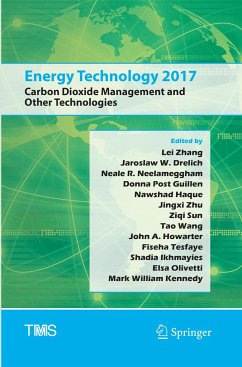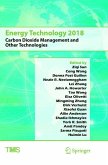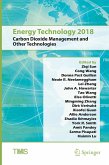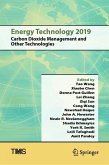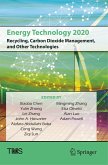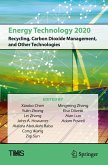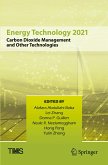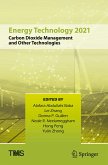Energy Technology 2017
Carbon Dioxide Management and Other Technologies
Herausgegeben:Zhang, Lei; Drelich, Jaroslaw W.; Neelameggham, Neale R.; Guillen, Donna Post; Haque, Nawshad; Zhu, Jingxi; Sun, Ziqi; Wang, Tao; Howarter, John A; Tesfaye, Fiseha; Ikhmayies, Shadia; Olive
Energy Technology 2017
Carbon Dioxide Management and Other Technologies
Herausgegeben:Zhang, Lei; Drelich, Jaroslaw W.; Neelameggham, Neale R.; Guillen, Donna Post; Haque, Nawshad; Zhu, Jingxi; Sun, Ziqi; Wang, Tao; Howarter, John A; Tesfaye, Fiseha; Ikhmayies, Shadia; Olive
- Broschiertes Buch
- Merkliste
- Auf die Merkliste
- Bewerten Bewerten
- Teilen
- Produkt teilen
- Produkterinnerung
- Produkterinnerung
This collection focuses on energy efficient technologies including innovative ore beneficiation, smelting technologies, recycling and waste heat recovery. The volume also covers various technological aspects of sustainable energy ecosystems, processes that improve energy efficiency, reduce thermal emissions, and reduce carbon dioxide and other greenhouse emissions. Papers addressing renewable energy resources for metals and materials production, waste heat recovery and other industrial energy efficient technologies, new concepts or devices for energy generation and conversion, energy…mehr
Andere Kunden interessierten sich auch für
![Energy Technology 2018 Energy Technology 2018]() Energy Technology 2018169,99 €
Energy Technology 2018169,99 €![Energy Technology 2018 Energy Technology 2018]() Energy Technology 2018232,99 €
Energy Technology 2018232,99 €![Energy Technology 2019 Energy Technology 2019]() Energy Technology 2019116,99 €
Energy Technology 2019116,99 €![Energy Technology 2020: Recycling, Carbon Dioxide Management, and Other Technologies Energy Technology 2020: Recycling, Carbon Dioxide Management, and Other Technologies]() Energy Technology 2020: Recycling, Carbon Dioxide Management, and Other Technologies154,99 €
Energy Technology 2020: Recycling, Carbon Dioxide Management, and Other Technologies154,99 €![Energy Technology 2020: Recycling, Carbon Dioxide Management, and Other Technologies Energy Technology 2020: Recycling, Carbon Dioxide Management, and Other Technologies]() Energy Technology 2020: Recycling, Carbon Dioxide Management, and Other Technologies154,99 €
Energy Technology 2020: Recycling, Carbon Dioxide Management, and Other Technologies154,99 €![Energy Technology 2021 Energy Technology 2021]() Energy Technology 2021160,49 €
Energy Technology 2021160,49 €![Energy Technology 2021 Energy Technology 2021]() Energy Technology 2021116,99 €
Energy Technology 2021116,99 €-
-
-
This collection focuses on energy efficient technologies including innovative ore beneficiation, smelting technologies, recycling and waste heat recovery. The volume also covers various technological aspects of sustainable energy ecosystems, processes that improve energy efficiency, reduce thermal emissions, and reduce carbon dioxide and other greenhouse emissions. Papers addressing renewable energy resources for metals and materials production, waste heat recovery and other industrial energy efficient technologies, new concepts or devices for energy generation and conversion, energy efficiency improvement in process engineering, sustainability and life cycle assessment of energy systems, as well as the thermodynamics and modeling for sustainable metallurgical processes are included. This volume also offers topics on CO2 sequestration and reduction in greenhouse gas emissions from process engineering, sustainable technologies in extractive metallurgy, as well as the materials processing and manufacturing industries with reduced energy consumption and CO2 emission. Contributions from all areas of non-nuclear and non-traditional energy sources, such as solar, wind, and biomass are also included in this volume.Papers from the following symposia are presented in the book:Energy TechnologiesAdvances in Environmental Technologies: Recycling and Sustainability Joint SessionDeriving Value from Challenging Waste Materials: Recycling and Sustainability Joint SessionSolar Cell Silicon
Produktdetails
- Produktdetails
- The Minerals, Metals & Materials Series
- Verlag: Springer / Springer International Publishing / Springer, Berlin
- Artikelnr. des Verlages: 978-3-319-84844-0
- Softcover reprint of the original 1st ed. 2017
- Seitenzahl: 524
- Erscheinungstermin: 13. Juli 2018
- Englisch
- Abmessung: 235mm x 155mm x 29mm
- Gewicht: 795g
- ISBN-13: 9783319848440
- ISBN-10: 3319848445
- Artikelnr.: 53570547
- Herstellerkennzeichnung Die Herstellerinformationen sind derzeit nicht verfügbar.
- The Minerals, Metals & Materials Series
- Verlag: Springer / Springer International Publishing / Springer, Berlin
- Artikelnr. des Verlages: 978-3-319-84844-0
- Softcover reprint of the original 1st ed. 2017
- Seitenzahl: 524
- Erscheinungstermin: 13. Juli 2018
- Englisch
- Abmessung: 235mm x 155mm x 29mm
- Gewicht: 795g
- ISBN-13: 9783319848440
- ISBN-10: 3319848445
- Artikelnr.: 53570547
- Herstellerkennzeichnung Die Herstellerinformationen sind derzeit nicht verfügbar.
The Minerals, Metals & Materials Society (TMS) is a member-driven international professional society dedicated to fostering the exchange of learning and ideas across the entire range of materials science and engineering, from minerals processing and primary metals production, to basic research and the advanced applications of materials. Included among its nearly 13,000 professional and student members are metallurgical and materials engineers, scientists, researchers, educators, and administrators from more than 70 countries on six continents.
Part 1: Energy Technologies: Energy Technologies.- Continuous optimization of the energy input - The success story of AOS.- Part 2: Energy Technologies: CO2 Management and Sustainable Metallurgical Processes.- Transforming the way electricity is consumed during the aluminium smelting process.- The thermodynamics of slag forming inorganic phases in biomass combustion processes.- Leaching of Sb from TROF furnace Doré Slag.- Potential CO2 emission reduction and H2 production using industrial slag wastes originating from different industrial sectors.- Part 3: Energy Technologies: Novel Technologies.- Modeling Anthropogenic Heat Flux in Climate Models.- In-situ microscopic study of morphology changes in natural hematite and Cu-spinel particles during cyclic redox gas exposures for chemical looping applications.- Thermodynamic stability of condensed phases in the ternary system CaO-Cu-O by the EMF method.- Experimental Study on Electro-spraying of Ethanol Based on PDA Measurement.- Part 4: Energy Technologies: Heat Recovery.- Integrated utilization of sewage sludge and coal gangue in clinker manufacture.- Valuable metals and energy recovery from electronic waste streams.- Dry Granulation of Hot Metal and Heat Recovery from Off-Gas.- Energy Recovery of Livestock Waste in Taiwan.- Life cycle assessments of incineration treatment for sharp medical waste.- Part 5: Energy Technologies: Poster Session.- Effect of granularity on pretreatment of coke with microwave irradiation.- Effect of Microwave and ultrasonic coupling treatment on granularity and microstructure of Pulverized Coal.- Influence of Sodium on Coke Microstructure in Different Reaction Atmosphere.- Part 6: Deriving Value from Challenging Waste Materials: Recycling and Sustainability Joint Session: Deriving Value from Challenging Waste I.- Maximizing the values of steelmaking slags.- Recycling of zinc from the steelmaking dust in the sintering process.- Direct Preparation of Metal Doping Ni-Zn Ferrite from Zn-containing Electric Arc Furnace Dust by Calcination Method.- Part 7: Deriving Value from Challenging Waste Materials: Recycling and Sustainability Joint Session: Deriving Value from Challenging Waste II.- Synthesis and Characterization of Ferrochromium Slag Based Glass-ceramics.- Hydrometallurgical processing of copper smelter dust for copper recovery as nanoparticles: a review.- Part 8: Deriving Value from Challenging Waste Materials: Recycling and Sustainability Joint Session: Deriving Value from Challenging Waste III.- Chromium removal from iron-rich waste generated during processing lateritic nickel ores.- Removal of Magnesium from Liquor Produced by Nickel Mining by Crystallization.- Synthesis of Magnesium Oxide from Ferronickel Smelting Slag through Hydrochloric Acid Leaching-Precipitation and Calcination.- Thermodynamic analysis of the recycling of aircraft Al alloys.- Lithium-ion Battery Recycling Through Secondary Aluminum Production.- Part 9: Deriving Value from Challenging Waste Materials: Recycling and Sustainability Joint Session: Poster Session.- Alternative method for materials separa-tion from crystalline silicon photovoltaic modules.- Bioleaching process for metal recovery from waste materials.- Chemical Analysis of Sludge Originating from Industrial Painting Performed in Brazil.- Preparing ferrosilicon alloy with copper slag.- Research on Optimization of Sintering Mixture with Low-grade Complex Ore.- Part 10: Solar Cell Silicon: Silicon Production, Crystallization, and Properties.- Study on Producing Solar Grade Silicon by Carbothermal Reduction of Andalusite Ore.- Phase Analysis of the Si-O2 System.- Characterization of Composition, Morphology, and Structure of Disi Raw Sandstones in Jordan.- Part 11: Solar Cell Silicon: Silicon Impurity Removal and Refining.- Effect of magnesium addition on removal of impurities from silicon by hydrometallurgical treatment.- Evaporation removal of boron in molten silicon using reactive fluxes.- Part 12: Solar Cell Silicon: Silicon Photovoltaics.- Electrodynamic Eddy Current Separation of End-of-Life PV Materials.- Investigation on Quartz Crucibles for Monocrystalline Silicon Ingots for Solar Cells.- Influence of Oxygen Content on the Wettability of Silicon on Graphite.- Particle Separation in Silicon Ingot Casting Using AC Magnetic Field.- Part 13: Advances in Environmental Technologies: Recycling and Sustainability Joint Session: Advances in Environmental Technologies: Characterization and Uncertainty.- Characteristics of Municipal Solid Waste Incineration Bottom Ash with Particulate Matters PM2.5 ~PM10.- Part 14: Advances in Environmental Technologies: Recycling and Sustainability Joint Session: New Areas of Value Recovery.- Accelerating life-cycle management protocols for new generation batteries.- Recovery of Metals and Nonmetals from Waste Printed Circuit Boards (PCBs) by Physical Recycling Techniques.- The use of rice husk ash as an aggregate for foundry sand mould production.- Part 15: Advances in Environmental Technologies: Recycling and Sustainability Joint Session: Poster Session.- Chemical reduction of Fe(III) in nickel lateritic wastewater to recover metals by ion exchange.- Chronopotentiometry applied to the determination of copper transport properties through a cation-exchange membrane.- Effect of flow rate on metals adsorption of synthetic solution using chelating resin Dowex XUS43605 in column experiments.
Part 1: Energy Technologies: Energy Technologies.- Continuous optimization of the energy input - The success story of AOS.- Part 2: Energy Technologies: CO2 Management and Sustainable Metallurgical Processes.- Transforming the way electricity is consumed during the aluminium smelting process.- The thermodynamics of slag forming inorganic phases in biomass combustion processes.- Leaching of Sb from TROF furnace Doré Slag.- Potential CO2 emission reduction and H2 production using industrial slag wastes originating from different industrial sectors.- Part 3: Energy Technologies: Novel Technologies.- Modeling Anthropogenic Heat Flux in Climate Models.- In-situ microscopic study of morphology changes in natural hematite and Cu-spinel particles during cyclic redox gas exposures for chemical looping applications.- Thermodynamic stability of condensed phases in the ternary system CaO-Cu-O by the EMF method.- Experimental Study on Electro-spraying of Ethanol Based on PDA Measurement.- Part 4: Energy Technologies: Heat Recovery.- Integrated utilization of sewage sludge and coal gangue in clinker manufacture.- Valuable metals and energy recovery from electronic waste streams.- Dry Granulation of Hot Metal and Heat Recovery from Off-Gas.- Energy Recovery of Livestock Waste in Taiwan.- Life cycle assessments of incineration treatment for sharp medical waste.- Part 5: Energy Technologies: Poster Session.- Effect of granularity on pretreatment of coke with microwave irradiation.- Effect of Microwave and ultrasonic coupling treatment on granularity and microstructure of Pulverized Coal.- Influence of Sodium on Coke Microstructure in Different Reaction Atmosphere.- Part 6: Deriving Value from Challenging Waste Materials: Recycling and Sustainability Joint Session: Deriving Value from Challenging Waste I.- Maximizing the values of steelmaking slags.- Recycling of zinc from the steelmaking dust in the sintering process.- Direct Preparation of Metal Doping Ni-Zn Ferrite from Zn-containing Electric Arc Furnace Dust by Calcination Method.- Part 7: Deriving Value from Challenging Waste Materials: Recycling and Sustainability Joint Session: Deriving Value from Challenging Waste II.- Synthesis and Characterization of Ferrochromium Slag Based Glass-ceramics.- Hydrometallurgical processing of copper smelter dust for copper recovery as nanoparticles: a review.- Part 8: Deriving Value from Challenging Waste Materials: Recycling and Sustainability Joint Session: Deriving Value from Challenging Waste III.- Chromium removal from iron-rich waste generated during processing lateritic nickel ores.- Removal of Magnesium from Liquor Produced by Nickel Mining by Crystallization.- Synthesis of Magnesium Oxide from Ferronickel Smelting Slag through Hydrochloric Acid Leaching-Precipitation and Calcination.- Thermodynamic analysis of the recycling of aircraft Al alloys.- Lithium-ion Battery Recycling Through Secondary Aluminum Production.- Part 9: Deriving Value from Challenging Waste Materials: Recycling and Sustainability Joint Session: Poster Session.- Alternative method for materials separa-tion from crystalline silicon photovoltaic modules.- Bioleaching process for metal recovery from waste materials.- Chemical Analysis of Sludge Originating from Industrial Painting Performed in Brazil.- Preparing ferrosilicon alloy with copper slag.- Research on Optimization of Sintering Mixture with Low-grade Complex Ore.- Part 10: Solar Cell Silicon: Silicon Production, Crystallization, and Properties.- Study on Producing Solar Grade Silicon by Carbothermal Reduction of Andalusite Ore.- Phase Analysis of the Si-O2 System.- Characterization of Composition, Morphology, and Structure of Disi Raw Sandstones in Jordan.- Part 11: Solar Cell Silicon: Silicon Impurity Removal and Refining.- Effect of magnesium addition on removal of impurities from silicon by hydrometallurgical treatment.- Evaporation removal of boron in molten silicon using reactive fluxes.- Part 12: Solar Cell Silicon: Silicon Photovoltaics.- Electrodynamic Eddy Current Separation of End-of-Life PV Materials.- Investigation on Quartz Crucibles for Monocrystalline Silicon Ingots for Solar Cells.- Influence of Oxygen Content on the Wettability of Silicon on Graphite.- Particle Separation in Silicon Ingot Casting Using AC Magnetic Field.- Part 13: Advances in Environmental Technologies: Recycling and Sustainability Joint Session: Advances in Environmental Technologies: Characterization and Uncertainty.- Characteristics of Municipal Solid Waste Incineration Bottom Ash with Particulate Matters PM2.5 ~PM10.- Part 14: Advances in Environmental Technologies: Recycling and Sustainability Joint Session: New Areas of Value Recovery.- Accelerating life-cycle management protocols for new generation batteries.- Recovery of Metals and Nonmetals from Waste Printed Circuit Boards (PCBs) by Physical Recycling Techniques.- The use of rice husk ash as an aggregate for foundry sand mould production.- Part 15: Advances in Environmental Technologies: Recycling and Sustainability Joint Session: Poster Session.- Chemical reduction of Fe(III) in nickel lateritic wastewater to recover metals by ion exchange.- Chronopotentiometry applied to the determination of copper transport properties through a cation-exchange membrane.- Effect of flow rate on metals adsorption of synthetic solution using chelating resin Dowex XUS43605 in column experiments.

